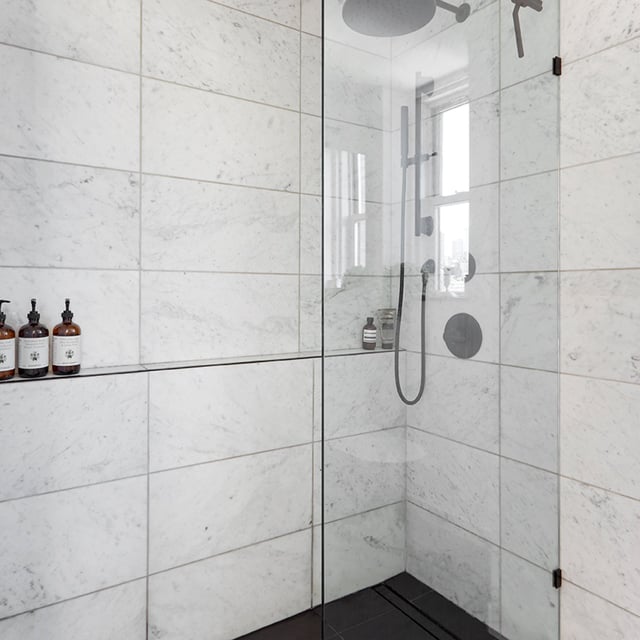
Shower
Shower Ideas For Small Bathrooms
12.27.2025


In This Article
Updating a bathroom starts with the surfaces you see and touch every day—and nowhere is that more important than in the shower. Tile has been the default choice for decades, but shower wall panels are emerging as a sleek, low-maintenance alternative. Available in a variety of materials, finishes, and installation styles, they open the door to new design possibilities—whether you want to simplify your remodel, cut down on upkeep, or give your bathroom a fresh, modern look.

Shower wall panels don’t offer the same level of design flexibility as individual tiles, so if you’re dreaming of intricate patterns or custom mosaics, tile may be the better fit. In larger showers, seams between panels can still be visible, though they’re usually less noticeable than grout lines.
Not all panel materials are equally durable—lower-cost options may scratch, fade, or warp over time. Relatedly, in some markets, traditional tile is still seen as a higher-end finish, which could impact resale value if buyers expect tile in a renovated bathroom. Still, this disadvantage is largely overstated; as will be evident in the section below, there are plenty of high-end shower wall panel materials that convey a sense of sophistication and lasting quality.
For more ideas on how to transform your shower, read Shower Remodel Ideas & FAQs.
Bathroom shower wall panels come in a variety of materials, each with its own strengths, drawbacks, and price points:
Acrylic panels are lightweight, fully waterproof, and easy to clean, making them a popular choice for modern bathrooms’ shower wall panels. They’re available in a wide range of colors and patterns. Their main disadvantage is that they may scratch more easily than some other materials and may not have the same high-end look as stone or tile.
Cost: $400–$900 for a standard shower surround (materials only).
PVC panels are budget-friendly, waterproof, and simple to install, making them ideal for quick updates or rental properties. However, they’re less durable than acrylic or solid surface panels and can warp or discolor over time, especially with heat exposure.
Cost: $150–$600 for a standard shower surround.
Solid surface panels offer a seamless appearance, high durability, and excellent stain resistance. They can even be custom-fabricated for your space. When compared to other shower wall panel options, their primary disadvantage is the higher upfront cost and required professional installation due to their weight.
Cost: $700–$2,000 for a standard shower surround.
Laminate panels come in a wide range of finishes, including realistic stone and tile looks, and are easy to clean and maintain. Seams must be properly sealed to prevent water intrusion, and they’re not as durable as solid surface or stone options.
Cost: $500–$1,200 for a standard shower surround.
Glass panels provide a sleek, modern look and are easy to clean, with the option for back-painted custom colors. They are expensive, heavy, and typically require custom fabrication and professional installation.
Cost: $1,000–$3,000+ for a custom shower surround.
Stone veneer panels offer the natural beauty and durability of stone with fewer seams than tile. They are heavier and more expensive, may require sealing, and professional installation is recommended.
Cost: $1,500–$4,000+ for a standard shower surround.


The total cost to install shower wall panels depends on several factors: the material you choose, the size and shape of your shower, the complexity of the installation, and whether you hire a professional or take a DIY approach. Materials alone can range from $150 for basic PVC panels to over $4,000 for premium stone veneer or custom glass. Labor costs for professional installation typically run between $500 and $1,500, depending on your location and the complexity of the job.
For a standard 3-wall shower, most homeowners spend between $800 and $5,500 for a complete, professionally installed wall panel system. This includes removing old materials, prepping the walls, fitting and sealing the panels, and finishing the edges. If your shower has custom features—like built-in niches, benches, or unusual shapes—expect costs to be on the higher end. While DIY installation is possible for some panel types, professional installation is recommended for solid surface, glass, or stone veneer panels to ensure a watertight, long-lasting result.
Compared to tile, wall panels are generally faster and less labor-intensive to install, which can help keep overall costs down. However, always factor in the long-term value: higher-quality panels may cost more upfront but can save you time and money on maintenance over the years.
For more pricing insights, check out How Much Does it Cost to Install a Shower and A Complete Guide to Bathroom Renovation Costs.
Choosing the right shower wall panels is just one part of a successful bathroom remodel. At Block Renovation, we connect you with highly qualified, handpicked bathroom contractors who understand the nuances of both traditional tile and modern wall panel installations. Our team will help you evaluate your options, select the best materials for your style and budget, and ensure your project is completed to the highest standards. With Block, you get clear pricing, expert guidance, and a streamlined renovation experience—so you can feel confident every step of the way.

Written by Block Renovation
Are shower wall panels a durable alternative to tile?
Can I install wall panels over existing tile?
How do wall panels compare to tile for resale value?
What’s the best way to clean shower wall panels?
Do wall panels work for both custom and standard showers?
Can shower wall panels be repaired if they get damaged?
Do shower wall panels help improve bathroom insulation or soundproofing?

Renovate confidently with Block
Easily compare quotes from top quality contractors, and get peace of mind with warranty & price protections.
Thousands of homeowners have renovated with Block

4.5 Stars (100+)

4.7 Stars (100+)

4.5 Stars (75+)

Shower
Shower Ideas For Small Bathrooms
12.27.2025

Shower
Large Shower Ideas to Feel Luxurious
12.27.2025

Shower
Shower Design Ideas for Wheelchair Users - ADA Compliance
12.23.2025

Shower
Images of Remodeled Showers to Inspire Your Own
12.23.2025

Shower
Complete Guide to Shower Types: Different Shower Heads, Handles & More
12.22.2025
Renovate confidently